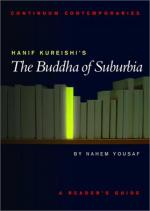|
This section contains 6,248 words (approx. 21 pages at 300 words per page) |

|
SOURCE: “Kureishi's Storytelling: Liquid Windows,” in Hanif Kureishi: Postcolonial Storyteller, University of Texas Press, 1998, pp. 240-57.
In the following essay, Kaleta provides an overview of the central themes, social and cultural concerns, and artistic techniques in Kureishi's fiction and films.
Popular response to Kureishi has not yet moved beyond initially reacting to his work with hyphenated cultural descriptors. After more than a decade, however, critical response to Kureishi appears to be moving toward an expanded perspective. He neither accepts nor acknowledges making cultural descriptors into literary criticism. Kureishi has not only survived his Anglo-Asian labeling, he has made use of the reputation it helped create. This is, indeed, one of his achievements—that he has not allowed his work to be confined to the mold that had been defined for it either by popular perception or by critics; instead, he has achieved critical recognition of his perspective as...
|
This section contains 6,248 words (approx. 21 pages at 300 words per page) |

|


